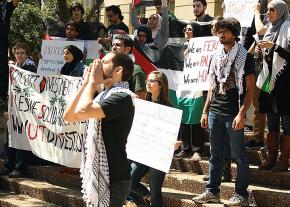No celebration of Israel’s occupation
reports from Austin on a week of events protesting Israeli apartheid.
"WE WILL join your celebration! When you end the occupation!"
Student protesters and activists chanted this at the tent hosting the "Israeli Block Party" on March 22 at the University of Texas at Austin. The block party's hosts, Texas Hillel and Texans for Israel, describe it as "the largest pro-Israel event on a college campus in North America [which] aims to highlight Israeli culture and progress to student community."
This event comes on the heels of a groundbreaking United Nations report that concluded Israel is an apartheid state. Report author Rima Khalaf resigned from the UN after pressure to withdraw her report.
In response to the Block Party, the Palestine Solidarity Committee (PSC), a student organization on campus, hosted its own annual "Israeli Apartheid Week"--a week full of panels, lectures, protests, performances and film screenings dedicated to educating students about the Palestinian struggle for liberation and the history of the settler colonial-state of Israel.
The exciting week started with a film screening of Roadmap to Apartheid, a documentary that explores the similarities and the differences between apartheid South Africa and the Israeli occupation of Palestine with a discussion held afterwards.

THE FOLLOWING day was the main protest against the Israeli Block Party. The Palestine Solidarity Committee mobilized student activists to protest across from the event tent, drawing out roughly 80 people over the course of the six-hour event. Signs read "No Ban On Stolen Land" and "Why Are You Celebrating Apartheid?"
The administration has always restricted protesters to a "protest zone" across the street from the event, yet today, the university cited its new "bias policy" that was a result of the university exploiting students' genuine concerns about a recent spate of flyers posted by the neo-Nazi group American Vanguard calling for a "Muslim-free America." Rather than implement an anti-hate policy against the neo-Nazis, the administration instead restricted free speech for campus activists and this new policy has emboldened the administration to crack down on protests.
Regardless, pro-Palestinian activists were able to attract hundreds of curious students--most of whom were unaware of the Israeli Block Party taking place.
In order to educate the campus community, the PSC constructed an information wall--imitating Israel's apartheid wall--that displayed information regarding the occupation. Among other things, the wall included: a visual of Palestinian land loss from 1922-2014; the outcome of a 2004 International Court of Justice vote concerning the construction of Israel's apartheid wall; quotes from Nelson Mandela, Malcolm X and Angela Davis; a list of military operations against the Palestinians; and a list of children's names killed on the 2014 assault on Gaza.
PSC members stood next to the panels to discuss and debate students who were passing by and talk about the struggle for Palestinian liberation. They sold shirts and stickers reading "No Peace On Stolen Land," as well as keffiyehs made in Palestine.
At some points, various students obnoxiously attempted to walk through the protesters, and Israeli Block Party participants tried to ridicule the PSC by taking selfies with the protest in the background.
The Daily Texan, the university newspaper, captured a debate between two passing students: "If you're supporting Zionism, you're supporting racism and engaging in a racist ideology...I'm against colonialism in all its forms, and I believe Israeli settlements constitute an act of colonialism," one student said. The other student replied, "I'm not a racist but I am a Zionist. They said that's impossible."
The idea of defending an apartheid regime is racist, however, and anti-Palestinian racism is one of the ways that Israel's settler-colonialism is justified.
In a statement, the PSC explained:
The Palestine Solidarity Committee (PSC) organizes the Israel Block Party Protest every year to speak out against the ethnic cleansing of Palestinians. The Block Party is hosted by Zionist organizations seeking to whitewash Israel's crimes and disseminate false propaganda about Israel...
We are against the normalization of genocide and systematic violence against Palestinians. There is an Israel Defense Forces booth, for example, which glorifies the military force responsible for enforcing occupation, apartheid and ethnic cleansing. This event also appropriates Palestinian culture and perpetuates the erasure of Palestinians. Our purpose is to speak out against these actions and show that they are not welcome on our campus.
CONTINUING THE events, a panel titled "Visions for Liberation: Palestine, Ferguson and Standing Rock" was held the following day, featuring professors Abdel Takriti and Nimer Sultany. The forum took up questions of liberation struggles in Palestine and South Africa, the Right of Return, Israel's Basic Law, the history of Zionism and more.
The week of events ended with Cafe Resistance, including a Palestinian folk music performance and anti-oppression songs, poems and even comedy from students. Works by poets at the event described what it felt like to be queer in today's society, the idea that United States suddenly became "amoral" under Donald Trump, and the fight for women's liberation.
Pro-Palestinian activists made it clear that as long as there are celebrations of Israeli apartheid on campus, there will be students protesting it--and building solidarity is key to that effort. We must continue to stand up against apartheid, against the U.S. government's unremitting support for Israel, and for the struggle for Palestinian self-determination.


